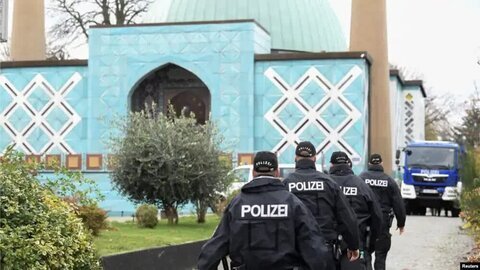A very wrong signal!

TEHRAN- On July 24, the German Ministry of the Interior issued a ban on the activities of the Islamic Center of Hamburg (IZH), following an unannounced and unwarranted raid on 53 properties across the country linked to the IZH such as the Islamic Academy of Germany, the Center for Islamic Culture in Frankfurt, the Islamic Association of Bavaria and the Islamic Center of Berlin as a sign of succumbing to the pressure of the Zionist lobby.
These Islamic centers had already been under pressure and inspection by the German police for several years.
The IZH with its 70-year history, is a precious legacy of the grand Shia scholar, Ayatollah Boroujerdi-- not only a heritage for Iran but for the entire Islamic world. This center has always operated above sectarian and even religious inclinations, striving for the rapprochement of various Islamic sects and other religions.
The IZH and other Islamic centers have made significant strides in fostering mutual understanding and interfaith dialogue through its social, scientific, and academic relationships and constructive cooperation with other religious centers in Germany and Europe. Despite their long-standing and transparent activities within the framework of German laws, these centers now face unfounded accusations of being used by Iran to circumvent sanctions or engage in other illegal activities! These claims are baseless, as the centers have consistently adhered over the past seven decades to the same vision and objectives outlined by Ayatollah Boroujerdi.
Given their compliance with German law, the ban on these Islamic centers by German judicial and law enforcement authorities is unjustified and violates principles of freedom of religion and thought, contradicting Europe's proclaimed respect for these freedoms. Such hostile actions are also fundamentally opposed to human rights principles.
Islamic centers in Germany, including IZH have provided invaluable services in elucidating Islamic teachings, promoting interfaith dialogue, and countering extremism. Europe must not forget that during the time of rising extremism (packaged as radical Islamism) the Islamic Republic of Iran stood as a barrier against such ideologies and their militant offshoots in the region. We were the shield that guarded the realms of the modern civilization.
The world owes Iran for its efforts in dismantling Daesh. Confronting Iran’s intellectual centers, which played a vital role in combating extremism, is neither an appropriate way to pay off this debt nor a positive signal at the dawn of a new Iranian administration. For that in our eyes, these centers' intellectual contributions to the fight against extremism parallel the efforts of Iran’s military advisors in the region against Daesh and Takfiri groups.
Closing these centers is a clear manifestation of Islamophobia, fostering fear of Islam and opposing the teachings of Abrahamic religions. It reflects a deliberate promotion of violence and dictatorship. The German government is well aware that these baseless accusations come from recognized terrorists and supporters of violence and extremism, aiming to incite religious and sectarian tensions. Yet, we believe that the Muslims of Germany alongside free-minded individuals will eventually thwart the plans of such terrorists and extremist groups.
Europe has seemingly turned a blind eye to a concerning reality: within its borders, extremist Salafi and Takfiri groups, members of the terrorist organization Mujahedin-e-Khalq (MEK), some factions of Daesh, and influential Zionist lobbies, all notorious for their radicalism, operate with relative impunity. Meanwhile, without substantial evidence, European authorities have shut down a cultural center with a 70-year history of promoting toleration, moderation, and interfaith dialogue, accusing it of extremism.
One critical error of the West lies in its Machiavellian approach, encapsulated in the flawed notion that "the end justifies the means." By supporting any group that opposes Iran, Western nations aim to undermine the Islamic Republic. During the early days of the Iranian Revolution, Saddam Hussein was their chosen mean. Today, they turn to terrorist groups and extremist ideologies to counter Iran. This strategy failed then and continues to fail now.
The Islamic Republic of Iran, backed by the Islamic Ummah and Iranian expatriates, which has doubled after “Operation True Promise”, will not abandon promoting pure and non-extremist Islamic thought and civilization and defending the rights of Muslims and Iranians worldwide, including in Germany. If the Germans, based on misguided advice they receive from terrorist cults and extremist elements, think they can cut Iran's ties with the Islamic Ummah and Iranian expatriates, they are entirely mistaken. Iran's Leader recently recommended the Western officials to neglect misguided counsel from “uninformed advisors”—a recommendation that remains pertinent today.
Germany is expected to uphold its commitments under international human rights treaties, such as the International Covenant on Civil and Political Rights, which guarantee freedom of expression, respect for religious freedoms, and the right to peaceful assembly. Immediate actions are required to reverse the closure and asset seizure of mosques and Islamic centers, to compensate for the material and moral damages inflicted on these institutions and their leaders, and to prevent the recurrence of such unlawful, anti-human rights actions. Moreover, Germany should create an environment conducive to the continued promotion of religious tolerance and interfaith dialogue.
The new President of the Islamic Republic of Iran, Masoud Pezeshkian, reiterated earlier in his article in the Tehran Times, that "Despite some missteps, I look forward to engaging in constructive dialogue with European countries to set our relations on the right path, based on principles of mutual respect and equal footing " Unfortunately, Germany's recent actions are not conducive to such dialogue and sends a very wrong signal. Yet, we hope the German Foreign Ministry will elucidate the consequences of these destructive measures to other German officials.
The Islamic Republic of Iran and European countries can start a new era of relations with the advent of the new Iranian government, provided that European countries, especially Germany, set aside fabricated prejudices and cooperate to expand relations.
Leave a Comment